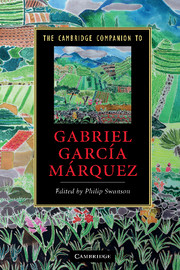Book contents
- Frontmatter
- Introduction
- 1 Gabriel García Márquez: life and times
- 2 The critical reception of García Márquez
- 3 Before One Hundred Years of Solitude: the early novels
- 4 One Hundred Years of Solitude
- 5 An eco-critical reading of One Hundred Years of Solitude
- 6 The Autumn of the Patriarch
- 7 The General in His Labyrinth
- 8 García Márquez’s novels of love
- 9 García Márquez’s short stories
- 10 García Márquez’s non-fiction works
- 11 García Márquez and film
- 12 García Márquez, magical realism and world literature
- Further reading
- Index
Introduction
Published online by Cambridge University Press: 28 September 2010
- Frontmatter
- Introduction
- 1 Gabriel García Márquez: life and times
- 2 The critical reception of García Márquez
- 3 Before One Hundred Years of Solitude: the early novels
- 4 One Hundred Years of Solitude
- 5 An eco-critical reading of One Hundred Years of Solitude
- 6 The Autumn of the Patriarch
- 7 The General in His Labyrinth
- 8 García Márquez’s novels of love
- 9 García Márquez’s short stories
- 10 García Márquez’s non-fiction works
- 11 García Márquez and film
- 12 García Márquez, magical realism and world literature
- Further reading
- Index
Summary
Gabriel García Márquez is much more than a writer: he has become something of an icon in his native Colombia and throughout Latin America, as well as a darling of the chattering classes throughout the world. The towering success of his 1967 novel, One Hundred Years of Solitude (Cien años de soledad), the wide popular appeal of his best-selling Love in the Time of Cholera (El amor en los tiempos del cólera [1985]), his Nobel Prize triumph in 1982 and his general association with the assiduously promoted Latin American New Novel and the marketing of the related phenomenon of magical realism - all of these factors were key in his national and international projection as the voice of Colombian, Latin American and even 'Third-World' identity alongside his identification with a new type of globally influential tropical, exotic, fantastic literature. By the middle of the first decade of the twenty-first century, his status as icon was solidified by a number of big 'events': the fortieth anniversary of the publication of One Hundred Years of Solitude and the much-hyped publication by the Real Academia Española and the Asociacin de Academias de la Lengua Española of a special commemorative edition (including a reprinted essay by Mario Vargas Llosa, which helped generate more publicity as it fuelled press speculation of a possible end to the rift between the two writers prompted famously by a bout of fisticuffs outside a Mexican cinema in 1976); the appearance of what has been widely touted as García Márquez's 'last' novel in 2004, coming out in English translation in 2005 under the title of Memories of My Melancholy Whores; and the much anticipated arrival in 2002 (2004 in English) of the first - and, many think, only - volume of the author's memoirs, Living to Tell the Tale (Vivir para contarla).
- Type
- Chapter
- Information
- Publisher: Cambridge University PressPrint publication year: 2010



